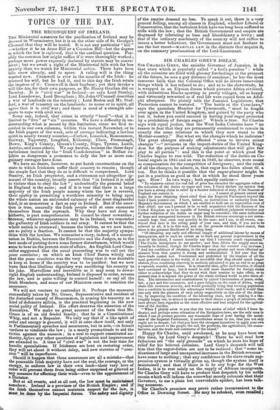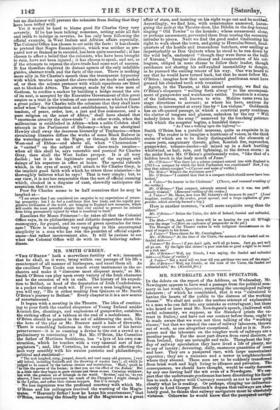SIR CHARLES GREY'S DREAM.
SIR CHARLES GREY, the amiable Governor of Jamaica, is in that state which is popularly called " a fool's paradise" : while all the colonists are filled with gloomy forebodings at the prospect of the future, he sees a gay distance of sunshine; he has the most innocent faith that the Colonial Office will do divers benevolent things which it has refused to do ; and as to the slave-trade, he is wrapped in an Elysian dream which pictures Africa civilized, with industrious Blacks sporting in pretty villages, all as happy and virtuously rewarded as if real life were copied from an Adel- phi afterpiece. He plainly tells the Jamaica Legislature, that Protection cannot be restored. " The battle of the Corn-laws," says the quondam Member for Tynemouth, " must be fought over again in the United Kingdom, and gained by the party who lost it, before you could succeed in having your sugar protected by a prohibition of foreign sugar." Which is true. Sir Charles says with equal justice, that the West India Colonies have " no reason to fear that they are permanently condemned to remain in exactly the same relations in which they now stand to the Mother-country." But what are the changes which he indicates? The great changes already effected " seem to involve minor changes"—" revisions in the import-duties of the United King- dom for the purpose of making adjustments that will give fats
i
play to all parties": and this is the point at which good Sir Charles begins to run wild. The reduction of the duties on Co- lonial sugars in 1845 and on rum in 1846, he observes, were meant as compensation for the competition of foreigners • and the result of all the changes, he admits, is, that sugar has fallen about 6/. a ton. But he thinks it possible that the sugar-planter might be put in a position as good as that in which he stood three years ago. How ? In two ways ; both equally curious- ' To whatever extent the real fall of price has exceeded the aggregate value of the reduction of the duties on sugar and rum I freely declare my opinion that you have a strong claim to relief by a further ;eduction of duty, if the finances of England can sustain it. . . . . . . . . . I cannot at present extend any hopes for your obtaining direct relief from the Imperial Parliament beyond the limit I have pointed out. I have indeed, no instructions or authority from her Majesty's Government on which I am entitled to hold out an expectation even of that relief; nor can I pretend to be so well acquainted with the finances of the United Kingdom as to be capable of forming a confident judgment whether any further redaction of the duties on sugar may be conceded: but some indications of large and unexpected increases in the Bntish revenue encourage a not unrea- sonable hope that such may possibly be the case; and I am, at all events, con- vinced that here is the strong point of your case, and that, if you are to be relieved at all, it is in this way, and on the grounds which I have stated, that there is the greatest likelihood of its being done. " Of obtaining any early and effectual supply of additional labour by means of immigration, and to such an extent as to work any general improvement in the state of the island, I cannot honestly say that I entertain much expectation." [The Coolie immigrants do not answer; and from Africa the supply must ne- cessarily be limited, though Sir Charles hopes that the number may increase.] "And my confidence of obtaining in the end some greater and more effectual as- sistance from that quarter is strong and undiminished. I feel sure that the slave-trade cannot last. Condemned and prohibited by the treaties of all the most powerful states in the world, it is incredible that they should much longer abstain from combining sincerely in methods calculated to put an end to so great a reproach, scandal, and crime. it is shameful that, after such treaties, it should have continued so long; but it would be still more shameful for foreign states either to acknowledge that they do not wish their treaties to take effect, or to pretend that it is beyond the power of the whole civilized world to give them ef- fect. The introduction and establishment by united Christendom of peace, order, law, a just and free commerce, and a pure religion on the coast of Africa, would abate this enormous atrocity, and would gradually bring that teeming population into a condition to estimate the advantages within their reach; and it would then rest only with the planters of each colony respectively on this side of the Atlan- tic, by improving the condition of the labouring class, and by making it a tho- roughly happy one, to attract in swarms to their shores a people of labourers, who have always been regarded as the most effective and beat adapted fur the agricul- ture of the Antilles.
" When I plainly avow to you that the two modes of relief which I have in- dicated, and perhaps some relaxation of the Navigation-laws, are the only ones in which I can at present perceive any reasonable hope of your having the assist- ance of the Imperial Parliament, it nevertheless seems to me, that you not only ought not to despair, but tbatyou have the strongest incentives to apply your own legislative powers to the people, the soil, the products, the agriculture, the manu- factures, and the trade and commerce of the island."
Happy Sir Charles, until awakened, as he may have been ere this time, by Lord Grey's despatch I There he will read how fallacious are " the only grounds" on which he rests his hope of relief for his beloved colonists. Lord Grey's despatch will tell him that the sugar-duties are not to be reduced ; that "some in- dications of large and unexpected increases in the British revenue" have come to nothing ; that any confidence in the slave-trade sup- pression system is virtually given up, though the system itself is maintained.; and that if there is to be any hope for the West Indies, it is to rest solely on the supply of African immigrants. Sir Charles Grey will have to produce that despatch by his noble cousin which will inform the somewhat moody colonists that their Governor, to use a plain but unavoidable epithet, has been talk- ing nonsense. Sir Charles's promises may prove rather inconvenient. to the Office in Downing Sweet. He may be rebuked, even rentlle4 ; but no disclaimer will prevent the colonists from feeling that they have been trifled with.
Yet it would be hard to blame good Sir Charles Grey very severely. If he has been talking nonsense, setting aside all fact and truth to indulge in reveries, he has only been following the official example, in West Indian and African affairs especially. The Colonial Office has chosen to set aside the facts: it has chosen to pretend that Negro Emancipation, which was neither so pre- pared nor so framed as to succeed, has been quite successful ; it has chosen to affect a belief that the colonists, who have been brought to ruin, have not been injured ; it has chosen to speak, and act, as if the attempts to repress the slave-trade had some sort of success. It has therefore deprived its distant agents of the only infallible guides, abstract truth and the facts of the case. There is nothing more silly in Sir Charles's speech than the transparent hypocrisy with which treaties against the slave-trade are made and spoken of, or than the solemn pretence with which squadrons are fitted out to blockade Africa. The attempt made by the wise men of Gotham, to confine a cuckoo by building a hedge round the site of its nest, is accepted by the Executive Government of this great empire as a trait in the wisdom of our ancestors on which to found a great policy. Sir Charles tells the colonists that they shall have relief when " the introduction and establishment, by united Chris- tendom, of peace, order, law, a just and free commerce, and a
pure religion on the coast of Africa," shall have abated that enormous atrocity the slave-trade ": in other words, when the millennium is established in Africa—when a sable Cobden shall triumph in the Parliament of Dahomey—when an aboriginal Howley shall sway the decorous hierarchy of Timbuctoo—when circulating libraries diffuse the works of some Black Bulwer in the watering-places on the Niger, or through the fashionable West-end of Ebboe—and above all, when " Christendom " is " united" on the subject of these slave-trade treaties— when all this shall be, says venerable and poetical Sir Charles Grey, then shall the West Indies prosper. It is all very foolish ; but it is the legitimate sequel of the sayings and doings of his superiors in office at home. The special ridicule which, in the eyes of many, will attach to Sir Charles Grey, is the implicit good faith with which he utters these niaiseries—he thoroughly believes what he says ! That is very simple ; but, to our view, it is not less respectable than the sort of official cunning which, cloaked in a disguise of cant, shrewdly anticipates the scepticism that it excites.
Poor Sir Charles seems to be half conscious that he may be laughed at— "I am aware that I sin considered too sanguine in my expectations of return- ing prosperity; but I do feel a confidence that free trade, and the rapidly gressive civilization of the world, are bringing to England new resources, w
will enable the most powerful empire that ever existed to prevent its colonies from being permanently injured by what is beneficial to itself."
Excellent Sir Moses Primrose !—he takes all that the Colonial Office says, in its philanthropic and didactic despatches about the cosmogony, for gospel, and its cases of green spectacles for trea- sure There is something very engaging in this uncorrupted simplicity in a man who has run the gauntlet of official experi- ences—but rather inconvenient also. It will be curious to see what the Colonial Office will do with its too believing subor- dinate.



























 Previous page
Previous page